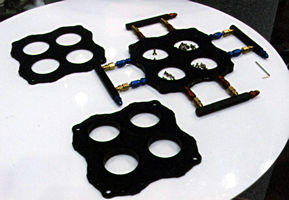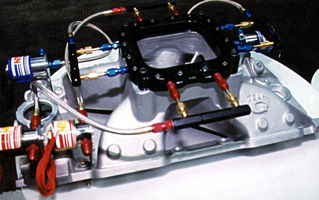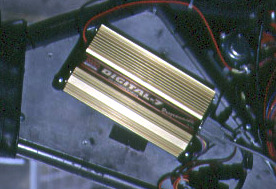|
IMPROVED NITROUS OXIDE INJECTION
 All
nitrous companies continue to improve their conventional nitrous oxide
delivery systems. Obviously, the more fuel and nitrous oxide you can
feed the engine the more power it will make. There is at least one new
system being produced that hasn't found its way onto a nitrous Pro Mod
engine yet. One of the last projects developed by the old NOS company
before it joined the Holley "family" was an annular discharge, nitrous
plate system (photo above). All
nitrous companies continue to improve their conventional nitrous oxide
delivery systems. Obviously, the more fuel and nitrous oxide you can
feed the engine the more power it will make. There is at least one new
system being produced that hasn't found its way onto a nitrous Pro Mod
engine yet. One of the last projects developed by the old NOS company
before it joined the Holley "family" was an annular discharge, nitrous
plate system (photo above).
Tests of this plate on engine builder Pat Musi's dyno have claimed
results of 500-hp from a single plate with a controller. According to
a tech at NOS, the annular flow plate requires less nitrous to make
power than the standard plate system. This annular flow plate mixes
the fuel and nitrous more uniformly, resulting in fewer "hot spots"
in the combustion chamber and less detonation. It hasn't been proven
yet, but it is certainly a tool available to the nitrous racers looking
for more power.
 Programmable
electronic fuel injection is another fuel delivery system that can help
prevent a too lean condition in the combustion chamber. EFI offers engine
tuners the added advantage of being able give each individual cylinder
what it needs in the way of fuel for optimum efficiency. Currently only
Harold Martin (top photo) is using EFI on an IHRA Pro Modified engine
although several other teams have been said to be considering the move. Programmable
electronic fuel injection is another fuel delivery system that can help
prevent a too lean condition in the combustion chamber. EFI offers engine
tuners the added advantage of being able give each individual cylinder
what it needs in the way of fuel for optimum efficiency. Currently only
Harold Martin (top photo) is using EFI on an IHRA Pro Modified engine
although several other teams have been said to be considering the move.
BETTER AND MORE POWERFUL IGNITIONS
 Detonation
is a very big, very expensive problem in nitrous oxide injection engines
and a limiting factor for how much power a tuner can make. A variety
of factors can produce detonation, including too much timing, too much
compression or a too-lean fuel mixture. Better fuel delivery has already
been discussed as one of the cures for detonation, but there are some
other possible solutions as well. Detonation
is a very big, very expensive problem in nitrous oxide injection engines
and a limiting factor for how much power a tuner can make. A variety
of factors can produce detonation, including too much timing, too much
compression or a too-lean fuel mixture. Better fuel delivery has already
been discussed as one of the cures for detonation, but there are some
other possible solutions as well.
One is to use a programmable ignition system. Several ignition companies
offer programmable ignitions, but the one that seems to be favored currently
is the MSD Digital-7 ignition. This ignition system allows the tuner
to advance or retard individual cylinder timing when and as much as
needed on each shift. He can also do the same with total timing. Currently
only Mitch Stott, who with his brother Quain have recorded the lowest
elapsed time of the year at 6.324, is using that type of ignition full
time.
Another ignition option available to nitrous racers is the MSD-44 amp
magneto. Conventional CD ignitions are generally accepted as being fine
for all applications excluding blown alky and nitro. There are those
engine builders who think an engine being fed a big dose of nitrous
has an environment in the combustion chamber more similar to a nitromethane
motor than a gasoline motor. In other words, a nitrous motor needs the
biggest, fattest spark available to keep burning fuel and not get blown
out or drowned by fuel; more than any CD style ignition can supply.
Technicians at MSD say that their 44-amp magnetos supply more current
than their CD-style ignitions. One racer testing the MSD magneto is
Tommy Grey who runs the "Undertaker" '53 Corvette. It is believed he
is trying a mag for two reasons:
- If he can find an ignition that will fire under bigger loads of
nitrous and whatever gasoline he is using, the engine will make more
power and
- A hotter, fatter spark will make for more complete combustion, which
will help cut down on detonation.
 |
page 2 of 3
|
|
|